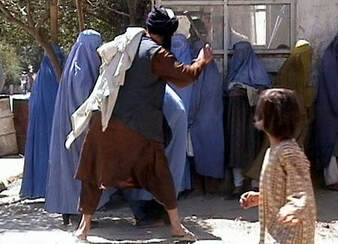|
My blog posts revolve around my interests and vocation as a historian: the intersection of history and contemporary church life, the intersection of history and contemporary politics, serendipitous discoveries in archives or on research trips, publications and research projects, upcoming conferences, and speaking engagements.
I sometimes blog for two other organizations, the Canadian Baptist Historical Society and the Centre for Post-Christendom Studies. The views expressed in these blogs represent the views of the authors, and not necessarily those of any organizations with which they are associated. |
|
Image from https://en.wikipedia.org/wiki/Taliban While the similarities with the ignominious US evacuation from Saigon, Vietnam, in 1975 are what is on most people’s minds watching the news over the US retreat from Afghanistan, the tragic and frenzied last-minute evacuation from Kabul reminds me of a different conflict. One much more distant in memory. The conflict I am thinking of is the South African War (1899-1902), commonly known as the Boer War.[1] The combatants were the mighty British Empire and the comparatively weaker Boers in two republics – the Transvaal and the Orange Free State.
But what does a nineteenth-century war in Africa and a modern war in Asia have in common besides both being waged thousands of miles away from the home front? Aspirations and outcome. One of the most striking similarities between the war in South Africa and the war in Afghanistan would be the lofty aspirations stated at the onset of war. Of course, there were varied stated (and unstated) strategic aims, but soldiers trudged off to war with the lofty goals of bringing liberty and a bright future to the oppressed. In South Africa, the wartime rhetoric was filled with optimism over ending the oppressive rule of the Boers over the Africans. While Britain’s view of the Africans was problematic and certainly not up to the standard of the twenty-first century West, it was at that time more enlightened than the Boer view. For many Boers, the Africans were to be treated as virtual slaves and sub-humans. When Canada’s first contingent of 1,039 troops prepared to board the Sardinian in Quebec City on Monday 30 October 1899, Prime Minister Laurier made it clear that he considered the cause to be one of justice. In the presence of the Governor General, the Premier of the province of Quebec, other civil and religious leaders, as well as 50,000 exuberant spectators, Laurier declared that “the cause for which you men of Canada are going to fight is the cause of justice, the cause of humanity, of civil rights and religious liberty. This is not a war of conquest.…The object is not to crush out the Dutch population, but to establish in that land…British sovereign law, to assure to all men of that country an equal share of liberty.”[2] In similar fashion, the troops sent to Afghanistan were sent with the aim of alleviating the plight of the downtrodden in the struggling nation – especially for women and children – and bring liberty. As President George W. Bush stated, the invasion and occupation of the nation was to help “build an Afghanistan that is free from…evil and is a better place in which to live.” In both cases, soldiers loaded in ships or planes had such noble rhetoric ringing in their ears, and they fought hard and well to bring about such a hopeful future. Sadly – despite initial victory – in both cases the final result was miserable failure. In the postwar years in South Africa, the British ended up turning over power to the Boers, which led in time to the Boer view of the Africans winning the day. And what followed was the birth of Apartheid in South Africa. In Afghanistan, despite their initial defeat the Taliban have smelled looming victory for years. And now that NATO and the West have given up on Afghanistan, they are already carrying out bloody acts of revenge, cutting off heads of collaborators, rounding up women and young girls for horrors, and creating a vicious regime of unfathomable darkness. Two wars a century apart, but two wars with similar aspirations and outcomes. Is there anyone to blame? On the one hand, demographics played a part.[3] The Boer populace greatly outnumbered the victorious British in South Africa, and the Western presence was miniscule in Afghanistan. In both cases, military and diplomatic realities were shaped by events on the ground, and the efforts of regime-change and nation-building could not succeed with such a demographic deficit. On the other hand, apathy on the home front played a part. In both cases, interest waned as soon a victory was declared. Pundits, politicians, and the general populace moved on to seemingly other more pressing matters, leaving the door open for the ideals of victory to be lost or abandoned. Sadly, what is clear is that it took almost a century after the British victory to see the promised rights and liberties advanced for all South Africans. As for Afghanistan, the descent into darkness has already begun, and the grim reality is that the citizens of Afghanistan (especially women and young girls) will almost certainly not see the promised light of day for generations. [1] This war in 1899-1902, called the South African War, was the largest war that Britain fought between the Napoleonic Wars and the First World War. Also called the Boer War, Anglo-Boer War, or the Second Anglo-Boer War (the First Anglo-Boer War was 1880-1881). Afrikaans call the war Vrijheidsoorlog (“freedom wars”). [2] For a study of Canadian churches and the war, see Gordon L. Heath, A War with a Silver Lining: Canadian Protestant Churches and the South African War, 1899-1902 (MQUP, 2009). [3] As did strategic considerations, economic realities, and political winds of change.
1 Comment
Antonio C. Bermonte
8/16/2021 04:47:10 pm
Once again, Professor Health has made some facilitating insights and his comparison between Afghanistan and the Boar War are poignant.
Reply
Leave a Reply. |
Archives
May 2024
|

 RSS Feed
RSS Feed
